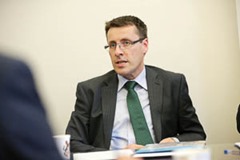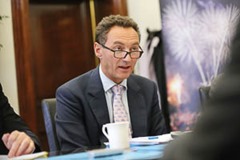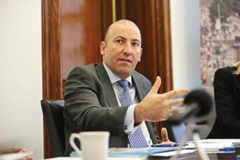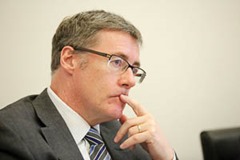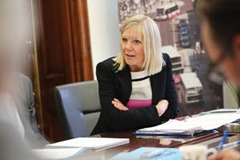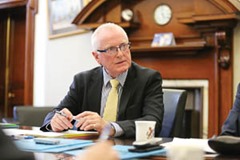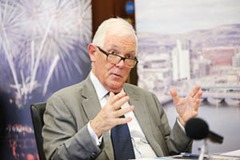Investing in Belfast: an urban strategy
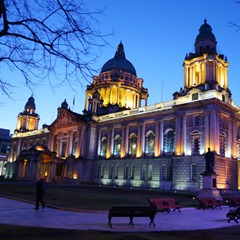 Belfast City Council hosted a round table discussion on the future development of Belfast including how it develops its business infrastructure, attracts more visitors and becomes a more creative city.
Belfast City Council hosted a round table discussion on the future development of Belfast including how it develops its business infrastructure, attracts more visitors and becomes a more creative city.
What are the main drivers shaping the future of Belfast?
Suzanne Wylie
Belfast City Council becomes a new authority on 1 April 2015 with new powers and responsibilities, particularly in planning and regeneration. That, I believe, is a real game-changer for the civic leadership role that the council can have in driving the city forward. In taking up that larger agenda, we need to focus on driving economic growth in the city and also find a way that allows some of that growth to be recycled into neighbourhoods and local areas to help deal with inequalities and deprivation.
Belfast is the economic driver for the region, experience and research around the world demonstrates that cities are driving regional economies. And within cities growth and investment in the city centre is critical.
One of our biggest challenges is to agree and stick with really clear city priorities which bring a focus to policy and investment decisions, alongside real city leadership and partnership where the people sitting round the table with the city council actually take ownership of those priorities and use their resources and influence to drive them forward.
Paul McMahon
We need to have a well-constructed vision. If you’re in the private sector and running a business, you have a vision of where you want to get to. We need to articulate it in a way that the key stakeholders – including the people of the city – buy into. It needs to be an all-encompassing vehicle for sharing what we are trying to achieve before we then look at how we actually achieve it.
People need to be proud of their city but they need to know why they’re going to be proud of it. It’s not always about a legacy. Sometimes, it’s about the future. We talk about our young people and how they’re going to be the future in our city. We have to bring them with us on this journey.
It’s also important that we do it in a realistic timescale. It needs to be short enough to keep momentum. There’s a big risk that, if we take too long, people lose interest and other priorities overtake it.
There’s a need for a vision and there needs to be coherence in that. We talk about leadership but we also need a lot of ‘followership’ in this city. A lot of people are striking out in different directions about the ‘next big thing’ but we need to settle on something.
In some ways, we have a lot of policy that is fairly settled but a difficulty in operationalising it. We have a Regional Development Strategy that talks about Belfast as the capital of the region and being its main economic driver. We have lots of metrics that demonstrate that but, across the sectors, we need to start putting that into practice and making some decisions that reflect the leading role of Belfast – not just in regeneration terms but in the delivery of all public services.
Robert Lyle
Reputation and image are vital for Belfast and if we lose the battle for reputation and image, whatever ideas we come up with will ultimately lose traction and momentum. The key things are to make sure that the vision and the brand are encompassing and evolving, and that the city is seen as welcoming.
In terms of the recent racist attacks, we do need to deal with that because that does go round this digital world that we have. Ultimately, our story is a good story in Belfast, about its people and a great future. If we can build that reputation and image – and get everybody to buy into it – a lot of the great ideas that there are here can come to fruition.
Joe Berridge
The fundamental thing is the connection between recognising that a modern city is about being essentially a knowledge economy and what it produces. That involves the linking of education to innovation and to enterprise. You’ve got to foster those connections all the way through.
It’s only by creating that value-added that you have a tradable commodity that the world wants to buy. Belfast has to put itself in that position. It used to have tradable commodities of ships and now it has tradable commodities of well-trained intellectual credibility.
You’ve got to create a competitive environment. That’s not just a competitive business cost environment, it’s also a competitive living environment, a cultural environment and a “buzz, fun, enjoy yourself” environment.
For me, the proposition for any city and particularly this city is around people. It’s fundamental to believe that the city can grow in a relatively short timeframe. It was a much bigger city and it needs to become a much bigger city again – so we need to create momentum around that.
We need a very conscious sense of Belfast’s place in terms of Northern Ireland and as the second city on the island of Ireland. We need to embed that proposition across the island: a persuasive case of why to “turn left” at Dublin Airport.
This city has a global brand. At times, we feel troubled by it but I think we need to feel unashamed even in difficult times. We have got a global brand and we are a city known for peace. We have re-established the Titanic brand in a whole new way. We have Game of Thrones, our science and engineering prowess and higher education institutions.
We are a very young city and we fail terribly if we don’t engage youth in everything that we’re doing. I don’t think youth want policies. They want excitement and hope and we need to stop thinking up policies and writing strategies and do lots of stuff that excites young people.
Alastair Adair
The main drivers will be all of those wealth generators who care and have a real stake in this city, such as the anchor institutions. The universities contribute 8 per cent of GVA to the city. The University of Ulster’s Belfast city campus development will see 15,000 students and staff on the northern edge of the city centre.
That is going to be a massive driver for economic regeneration for an area which has a massive educational gap. The average house price in the north of the city is half of that in the south so there is a massive wealth gap there as well.
It’s also about hearing the voice of business in driving this forward: a co-ordinated approach to ‘sweating the assets’ of the city and having a joined-up vision between the politicians and the business community to drive Belfast forward.
How can Belfast thrive as a centre for business?
Joe Berridge
Belfast has three airports serving it inadequately right now. I would like to see an overall strategy for air connectivity as national, European and global connectivity is critical to the success of any city. Because you are an island, Belfast bats a little above its weight in terms of air connectivity. That’s the upside of the downside. Is there a possibility of consolidation of the two airports? We also need to recognise the marvellous connectivity of Dublin, which is an enormous asset to this city.
It is not just airport infrastructure. It is all infrastructure that is key for people using the city and that includes buses and trains. Access to the city is not designed adequately and there has to be a more grown-up conversation about this. It shouldn’t be one or the other. There should be a choice between the car and public transport. The additional 2,000 cars coming into the city when the University of Ulster moves will be a challenge. Businesses don’t want to come into a city that is hard to get in and out of.
Alastair Adair
We need to have a more ‘can do’ attitude. We now have a global brand for the city with things like Game of Thrones. We need to cater for the 24/7 economy, which is also the experience economy. It is also about our assets. For example, we still don’t have a critical mass in art galleries that will bring people into the city.
Suzanne Wylie
Belfast needs to be ‘open for business’ which means focusing on things like infrastructure and connectivity. We also have to get our competitive positioning right, which comes back to our brand and our offering – why should people want to invest, visit or come to live here and work here?
A critical piece of the city’s infrastructure is its skills base which drives business growth and investment. We have a real challenge here, with inward investors telling us we do not have enough graduates for some sectors. And whilst we have some of the best academic results we also have 30 per cent of our population with no qualifications – 50 per cent in some areas of the city. We have to fix that.
Mark O’Donnell
We have a lack of critical mass across a range of areas. We are also an incredibly car-bound society and there are many households in disadvantaged areas that do not have access to a car. This underlines the importance of the public transport system and the need to develop a compact city that is easy to get around and with people living in the centre that will give it a vibrancy.
Joe Berridge
I am struck by the economy of the city and that 27 per cent of the people in the city are economically inactive. The city needs a wash of cash: money in people’s pockets. I understand that the causes of this inactivity are complex but it needs to be addressed if the city is going to thrive.
David Gavaghan
I remember being at a lunch in this wonderful building some years ago with people over from the City of London. There was considerable doubt Belfast could establish itself as a centre for financial services. Looking back we have perhaps surprised ourselves significantly. This city now has established expertise in financial technology, operations, analytics, legal services and compliance. According to the FT fDI Markets (2012), Belfast is the number one destination globally for financial technology R&D investments. The city is also among the top cities globally for financial services technology investments ahead of Dublin, Toronto, Warsaw and Bangalore.
It is not just about infrastructure but about the ambition to think on a bigger scale. Game of Thrones has been good for the city but the intellectual property is not created here and we need to focus on that in order to develop the creative sector. The creative hub that is planned for the Donegall Street area offers the opportunity to develop that intellectual property within the city and get our ideas working on a global scale.
How can Belfast be enhanced as a visitor destination?
David Gavaghan
We need to be more ambitious and to have double digit growth as our goal. It’s about ambition and it is better trying for 10 per cent and failing by a percentage point or two than achieving 5 per cent and patting ourselves on the back.
Joe Berridge
Titanic Belfast drops from outer space and attracts 700,000 visitors a year. Where did these people come from? There is obviously a pent-up appetite for tourism to the city. There is a real imperative now to focus on: “What is the next big attraction?” The city will need to take another bold step to add another big attraction.
Alastair Adair
Belfast is one of a number of global brands we have on the northern part of the island – Titanic Belfast, the Giants Causeway and the Fermanagh Lakes. We have a cluster of key assets and we have to enhance the offering and develop an infrastructure to cope with increasing numbers of visitors – so that when a cruise ship comes in and three coach loads of visitors go to St Anne’s Cathedral, it shouldn’t cause traffic chaos. The big challenge is to cope with mass tourism in Belfast.
We need to be really ambitious about tourism as I think we are just scratching the surface. We do need to improve connectivity and how we present and market the city – not just worldwide but also to our near neighbours in the south and in the English cities. For example, we have 22 direct flights from Great Britain and we need to market Belfast better in those cities. We also need to develop our assets – food, music, literary tourism and the brand of Titanic. I agree that we need another big attraction but it needs to be unique to us and authentic to the city. We need to keep people in the city a few more nights, improve our hotel stock and how we run events and festivals perhaps packaging smaller events together.
Paul McMahon
In tourism, we have done some things really well. There was an event recently in the city called Culture Night. That should have been Culture Weekend. We should also give visitors what they want. We have to stop telling them you can’t do this on a Sunday or you can’t have a casino. Visitors want these things when coming to multi-cultural, diverse and exciting cities.
Mark O’Donnell
I would like to add the success in attracting business conferences which will be further helped with the extension of the Waterfront Hall.
How can Belfast become a more creative city?
I would argue that Belfast must become a more creative city by developing a positive and pro-active strategy to promote creativity by building a critical mass of creative industries and offerings in key locations. Modern global cities have their distinctive creative quarters and cultural offerings such as Liverpool’s waterfront and Tate Liverpool. There have to be complementary cultural offerings across the province to draw in tourists and get them to stay longer.
Higher education and making more creative use of universities is key. University education is also now vital to supporting the ‘third wave’ of ICT driven technologies. We are seeing the emergence of higher paid jobs in Northern Ireland driven by this ‘third wave’ but the danger is that it will widen the gap between the highly skilled and those with less skills, as it is doing at a global level.
Robert Lyle
There are two proposals: one for a creative hub and the other for a media hub. The creative hub is for smaller digital businesses and the creative and expressive arts and to encourage these companies to grow and agglomerate and give them suitable space and high speed broadband. I have been in the old Cunningham Coates building which is proposed for the hub and it looks like a good space to kick-start this sector which includes companies involved in website development, apps, big data, search and social media. The focus needs to be outward-facing as we have a very small local market.
The media hub is more difficult as there are existing players. We have a production company sector that produces programmes for all the main networks. The hub idea could bring smaller production companies together to go after bigger projects. BBC’s “The Fall” has been brilliant for Belfast and is perhaps a better legacy than even Game of Thrones, as a lot of the intellectual property was developed in Belfast. One of the reasons The Fall was made was due to the BBC’s quota of 3 per cent of production that has to be from Northern Ireland. It would be worthwhile looking to extend this quota idea to other channels.
David Gavaghan
This place has got a huge global reputation for amazing people. Why are we not more confident about ourselves? We need to be brave about talent and supporting our artists. This place has produced some giants – Oliver Jeffers, Liam Neeson, Ciaran Hinds and Seamus Heaney to name a few that have a global reach.
The urban economist Richard Florida makes the point, a city that is not tolerant will not engender creativity.
It’s not just the racist attacks but the intolerance towards the gay community. Ethnic diversity is a key ingredient for success.
What one issue should policy-makers and city managers focus on to develop the city?
Suzanne Wylie
Fundamentally, we need a shared agenda and shared priorities for the city that everybody can identify with. That is why the council has commissioned its city centre regeneration and investment plan. It’s also important to agree some ‘quick wins’ to get momentum going and demonstrate we are serious about Belfast driving growth for the region.
Paul McMahon
Regeneration is the key but that needs clearly defined and deliverable policies now – not some time down the road. We have to stop the Executive fighting amongst itself, because the rest of the world sees that, and we have to have the courage of our conviction that delivers something that will be perhaps Belfast-centric but is for the greater good of Northern Ireland.
Mark O’Donnell
We need to focus on having a blend of things in the city centre that make it a compact, walkable space. We have all the building blocks in place and we have a lot of demand – latent and emerging – and we need to bring it all together. And that includes people living here.
Robert Lyle
Fight for Northern Ireland’s 3 per cent in terms of TV commissions. Belfast City Council could help lead that fight. Maybe not all of the 3 per cent will be made in Belfast but we’re going to get the vast majority of it. That could bring a lot of network commissions that could get a lot of production companies going and change the creative industry in the city.
You have to change the conversation. You have to have 200 people – community, cultural, business and academic leaders – who say: “We want this to happen.”
The conversation always falls into the downside if you’re not careful and nobody kicks it back into the upside. Whenever there are doubts or uncertainties or criticisms, you’ve got to have a group of people who say: “No, we know what we’re doing, we know what we want to do.”
It’s the upside conversation that makes it happen and that can’t just be a Chief Executive, a Mayor or politician. It actually has to be the Belfast ‘tribe’ that makes it happen. Part of the job is to create that tribe.
David Gavaghan
We can do everything we like but if we don’t get the punters, we’ve missed the whole proposition. I don’t know if we spend enough time understanding the market. I totally agree with collaboration but not with dirigisme. We are in global terms a very, very small city and we have got to work out how we get people here.
Alastair Adair
I would argue strongly that the one issue that policy makers and city managers should focus on is ‘prosperity before politics’ for the following reasons: prosperity depends on promoting enterprise in order to make Belfast an attractive locations for investment, tourists and the local population to spend their income and support local businesses. It is also about educating the population to ensure they have the higher education skills to support the knowledge economy and that the gap between the skilled and unskilled population is minimised. All this is about creating wealth to support essential infrastructure investment in the health, education and business.
Participants
Suzanne Wylie
Suzanne Wylie took up the post of Chief Executive of Belfast City Council on 1 July 2014. She will steer the council through local government reform and use the opportunities that presents to redefine the council’s role in the development and growth of the city. Having worked for the council for 26 years, she was most recently Director of Health and Environmental Services (2010-2014).
Alastair Adair
Alastair was appointed as Pro-Vice-Chancellor (Development) at the University of Ulster in August 2008. He was previously Head of the School of the Built Environment and the inaugural Dean of the Faculty of Art, Design and the Built Environment. His responsibilities include community relations and Greater Belfast development. He is also Provost for Jordanstown and Belfast.
Joe Berridge
Joe, a partner at Urban Strategies in Toronto, has a background in strategic and large-scale master planning. His UK projects include the reconstruction of Manchester city centre and a new strategic investment plan for Liverpool. He teaches in the Program in Planning at the University of Toronto and is a fellow in the School of Public Policy and Governance.
David Gavaghan
David has been Chief Executive of Titanic Quarter Limited since June 2012. Titanic Quarter is located in the heart of a new, thriving Belfast – with the potential to become one of the most strategic and exciting developments across the islands of Ireland and Britain. The ambition is to return the area in a modern day context to what it was a century ago – a hive of industry, creativity and wealth formation. Apart from holding a number of external positions including the Chair of Visit Belfast and the Chair of ARENA Network, David is married to Helen O’Malley and together they have eight children.
Robert Lyle
Robert heads up the LyleBailie International Media Department, working across all areas of the creative economy, including TV, radio, press, outdoor, digital and cinema. He has 29 years’ experience in the media industry and is co-author of many award-winning IPA/IAPI effectiveness case studies for road safety, waste management, noise pollution and the Belfast Giants.
Paul McMahon
Paul is the Centre Director of CastleCourt and the President of Belfast Chamber of Trade and Commerce. Paul worked in a senior management role for retailers, including BhS, Makro, TK Maxx and Winners of Canada, before moving to the property and shopping centre sector in 2006. He holds an MSc from the University of Ulster and is a professional member of the RICS.
Mark O’Donnell
Mark has been Director of the Department for Social Development’s Belfast City Centre Regeneration Directorate since November 2012, having acted as Director of the Belfast Regeneration Office for the preceding year. A sociology graduate, he entered the Northern Ireland Civil Service in 1993 and served as ministerial private secretary.

